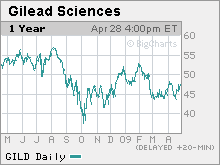Swine flu fear a boost for Gilead
The biotech's bottom line could benefit from sales of Tamiflu, one of the only treatments for the influenza strain.
NEW YORK (Fortune) -- It's been a busy few weeks for Gilead Sciences.
Since Fortune last checked in on it, the biotech has reported record first-quarter revenues, completed its all-cash acquisition of CV Therapeutics, and launched the Phase II trials of its most promising pipeline product, the four-in-one, once-daily HIV "quad pill."
Now Gilead (GILD, Fortune 500) is in the spotlight again. As governments formulate their responses to the deadly swine flu outbreak, which has already claimed over 100 lives in Mexico and triggered a worldwide public health emergency, Gilead is one of the drugmakers that could benefit.
That's because its antiviral pill Tamiflu, which is marketed by Roche, is one of two drugs that is effective against this strain of influenza. Gilead collects royalty payments from Tamiflu sales, which peaked at $2 billion in 2006 as countries rushed to stockpile the drug against the threat of avian flu.
Tamiflu sales plummeted after governments finished building up their reserves. From 2007 to 2008, Gilead's royalties dropped 63% to $156 million, just 3% of annual revenues. But if countries are forced to dip into their stockpiles to combat the swine flu, sales could rebound.
The U.S. Centers for Disease Control and Prevention has already released 12.5 million doses of Tamiflu, which Citigroup analyst Yaron Werber estimates are worth $250 million in sales. Confirmed cases of swine flu in the U.S. climbed to 91 Wednesday with the nation's first reported death, a 22-month old child who traveled to Houston from Mexico for treatment.
"It remains to be seen how much usage there's going to be and how much further stockpiling there might be," says Werber. "But we assume that the U.S. government will need to restock that $250 million worth of orders. For every $100 million in sales, that adds roughly two cents to Gilead's bottom line."
Other analysts are even more bullish. "Governments around the world, not just the U.S., that distribute Tamiflu are not going to take back the Tamiflu that's not used, so it's likely we'll see new purchases," says ThinkEquity's Jason Kolbert.
Gilead shares have risen 4% since Friday to close at $47.60 Tuesday.
Any boost from Tamiflu sales would be a bonus for Gilead, whose main growth continues to come from its first-in-class HIV-treatment franchise (which has helped the biotech make Fortune's list of Fastest-Growing Companies for three out of the past four years.)
"When governments were stockpiling Tamiflu, one of the concerns among investors was that this was not a repeat business, and what would happen when those sales dried up," says Citi's Werber. "But because of the strength of their business in HIV, Gilead's been able to absorb that loss of royalties just fine and grow very robustly."
Last week, the company reported record first-quarter revenues of $1.53 billion, up 22% from a year ago. Sales of Gilead's once-daily combination HIV drugs Atripla and Truvada drove the results, with revenues up 57% and 23%, respectively.
Atripla and Truvada are already two of the most frequently prescribed HIV drugs. They include Gilead's proprietary compound tenofovir, which has become a preferred backbone treatment for HIV thanks to a superior efficacy and safety record.
In fact, Gilead's drug portfolio stacks up so well against big pharma that when Pfizer (PFE, Fortune 500) and GlaxoSmithKline (GSK) recently announced plans to combine their HIV businesses into a new company, analysts largely dismissed the threat. "We see negligible impact as we believe [Gilead] clearly has the better drugs...and execution in HIV," Morgan Stanley's Sapna Srivastava wrote in a research note.
Many analysts believe Gilead has emerged as the company best positioned to benefit as HIV care expands, driven by shifts towards aggressive screening and earlier treatment, or starting patients on antiviral therapy before a precipitous drop in T-cell count.
If the Department of Health and Human Services revises its guidelines to recommend earlier treatment as anticipated, tens of thousands of new patients could begin therapy over the next few years. The majority would start on a regimen that included a Gilead drug.
In the meantime, additional Tamiflu sales will only help Gilead's bottom line.
"Tamiflu is very positive for Gilead because it comes in as a royalty payment, so there's very low overhead associated with that," says ThinkEquity's Kolbert. "The quality of these revenues is very, very high." ![]()
-
 The retail giant tops the Fortune 500 for the second year in a row. Who else made the list? More
The retail giant tops the Fortune 500 for the second year in a row. Who else made the list? More -
 This group of companies is all about social networking to connect with their customers. More
This group of companies is all about social networking to connect with their customers. More -
 The fight over the cholesterol medication is keeping a generic version from hitting the market. More
The fight over the cholesterol medication is keeping a generic version from hitting the market. More -
 Bin Laden may be dead, but the terrorist group he led doesn't need his money. More
Bin Laden may be dead, but the terrorist group he led doesn't need his money. More -
 U.S. real estate might be a mess, but in other parts of the world, home prices are jumping. More
U.S. real estate might be a mess, but in other parts of the world, home prices are jumping. More -
 Libya's output is a fraction of global production, but it's crucial to the nation's economy. More
Libya's output is a fraction of global production, but it's crucial to the nation's economy. More -
 Once rates start to rise, things could get ugly fast for our neighbors to the north. More
Once rates start to rise, things could get ugly fast for our neighbors to the north. More








